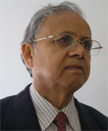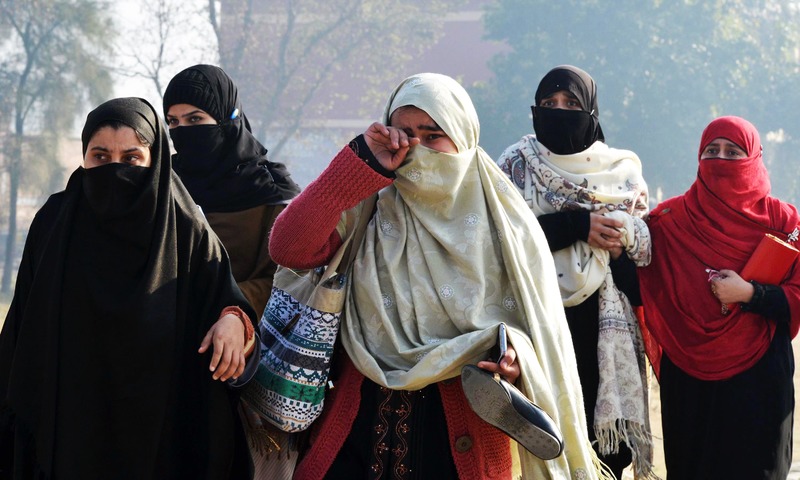www.aljazeerah.info
Opinion Editorials, January 2016
Archives
Mission & Name
Conflict Terminology
Editorials
Gaza Holocaust
Gulf War
Isdood
Islam
News
News Photos
Opinion Editorials
US Foreign Policy (Dr. El-Najjar's Articles)
www.aljazeerah.info
Attack on Bacha Khan University:
Students in the Line of Fire Again in Pakistan
By Abdus Sattar Ghazali

Al-Jazeerah, CCUN, January 22, 2016
 |
|
| Pakistani students coming out of the Bacha Khan University after shooting, January 20, 2016 dauwn |
At least 25 people including students, teachers and security guards lost their lives Wednesday when armed militants broke into Bacha Khan University in Pakistan’s northwestern province known as Khyber-Pakhtunkhwah where Pakistan's mercenary army is conducting a brutal operation against militants.
Media reports said all four terrorists, who had stormed the university, have been killed and the security forces have taken control of the University in Charsadda near Peshawar, capital of Khyber-Pakhtunkhwah.
The News reported that the heavily armed terrorists scaled one of the boundary walls from the backside of the university with an aim to carry out an attack like the one on Army Public School, Peshawar in December 2014 killing 144 people most of whom were students.
The alleged mastermind of the Army Public School Peshawar attack, Umar Mansoor, of the banned Tehreek-i-Taliban Pakistan (TTP) Geedar group has claimed the attack through a post on his Facebook page, saying that four attackers were sent to the university.
However, a spokesperson from the TTP, Mohammad Khorasani, was reported issuing a conflicting statement shortly after Mansoor's claim, in which Khorasani condemned the attack, terming it "against Shariah". Khorasani also warned that those "using the naming of TTP will be brought to justice".
Director General of Military Public Relations, Lt Gen Asim Bajwa on Wednesday told a press conference that there were a total of four terrorists who were contained and killed at the hostel’s stairs and rooftop. He said two cell phones which were in terrorists’ use have been seized. He said even after the terrorists were killed, one of the mobile phones were still getting calls from an Afghan SIM. "We also have information where the instruction to the terrorists were being made," he said.
The Indian Factor
The attack took place four days after India’s Minister for Defence Manohar Parrikar said “those who attacked us will also feel the same pain, the place and type of response would be of our choice”. On January 17, just two days ahead of today’s attack, Parrikar repeated his threatening statement in some other words. “Our patience at Pakistan’s move against terrorists - who carried out Pathankot and Mumbai attacks - is running thin. The world will see the results in the next one year,” he had said.
Former Interior Minister Rehman Malik told The News that it is an international conspiracy and RAW and India are behind this. “After Pathankot attack, the Indian Minister said that Pakistan will face its consequences in the coming month,” he said. “The new wave of terrorism is the proof of this conspiracy,” he added. He said the attack on Bacha Khan University is a continuity of the attack on the army public school in December 2014.
The Daily Times quoted a private TV channel as reporting that the Indian consulate in Afghanistan’s Jalalabad city provided Rs 3 million ($ 30,000.00) to the militants in order to carry out Charsadda attack.
However, the government of Pakistan did not issue any statement implicating India in the attack.
Who is Bacha Khan?
Bacha Khan University was founded in 2012 and named after Abdul Ghaffar Khan, a Pashtun nationalist leader known famously as Bacha Khan. Wednesday (Jan 20) was his 28th death anniversary. The Chardadda attack coincided with his death anniversary.
Bacha Khan was a close friend of Mahatma Gandhi who strongly opposed the Muslim League’s demand for partition of India and creation of Pakistan. When the Indian National Congress declared its acceptance of the partition plan without consulting him he felt very sad. He told the Congress “you have thrown us to the wolves.”
He was closely identified with Mahatma Gandhi because of his non-violence principles. He is known in India as the 'Frontier Gandhi'. In 1929 he founded a non-violence Khudai Khidmatgar (Servants of God) movement. He told its members: "I am going to give you such a weapon that the police and the army will not be able to stand against it. It is the weapon of the Prophet, but you are not aware of it. That weapon is patience and righteousness. No power on earth can stand against it."
After independence of Pakistan, Bacha Khan pledged allegiance to Pakistan and demanded an autonomous “Pashtunistan” administrative unit within the country.
Though he lived a fairly long life, roughly one out of every three days of his life were spent in prison — eventually even surpassing the number of years the legendary Nelson Mandela had spent in jail.
In 1962, Bacha Khan was named an "Amnesty International Prisoner of the Year". Amnesty's statement about him said, "His example symbolizes the suffering of upward of a million people all over the world who are prisoners of conscience."
In 1984, he was nominated for the Nobel Peace Prize.
Bacha Khan died in Peshawar under house arrest in 1988 at the age of 98. He was buried in his house at Jalalabad, Afghanistan. Over 200,000 mourners attended the funeral, including the Afghan president Najibullah. Apparently, this was a symbolic move by Bacha Khan, as this would allow his dream of Pashtun unification to live even after his death.
Analysts wonder why the militants chose the 28th anniversary of Bacha Khan to launch this terrorist attack on his University?
The Daily Nation wrote: "This attack on another educational institution holds a lot of symbolic value. This is the third major attack in KPK in a month – all after Army’s continuous propagation of ‘phenomenal success’ and ‘broken backbones of terrorists’ in Zarb-e-Azb."
"Whatever the military demanded, civilian government gave – from military courts to foreign policy, everything has been under control of Army. But what are the results beyond photo-ops and extensive PR gains?", the Nation added.
Abdus Sattar Ghazali is the Chief Editor of the Journal of America (www.journalofamerica.org) Email: asghazali2011 @ gmail.com
==========================================================================================================
Bacha Khan University teachers forced to go on battlefront to save students’ futures
Dawn, January 22, 2016
CHARSADDA:
Stuck with 15 of his students on a third floor balcony of a campus building as gunmen came up the stairs, university director Mohammad Shakil urged police personnel arriving at the scene to toss him a gun so he could fight back.
“We were hiding ... but were unarmed,” said Mr Shakil, narrating the events that unfolded on Wednesday when four militants attacked Bacha Khan University in Charsadda.
“I was worried about the students, and then one of the militants came after us,” he recalled. “After repeated requests, the police threw me a pistol and I fired some shots at the terrorists.”
As details of Wednesday’s assault emerged, attention focused on at least two members of staff who took up arms to resist the attackers.
Some hailed them as heroes, as the country digested an attack which bore similarities to the massacre, in late 2014, of 144 students at the Army Public School in Peshawar, about 30 kilometres from where the latest assault occurred.
Others questioned whether teachers should be armed, as many are, because it goes against the ideals of the profession.
Such a dilemma may have been far from the mind of chemistry professor Hamid Hussain, as he locked himself inside a room with colleagues after gunmen stormed an accommodation block on the campus.
When the assailants broke down the door, Hussain fired several rounds from his pistol, according to Shabbir Ahmad Khan, an English department lecturer taking cover in an adjacent washroom.
“They carried on heavy shooting and I was preparing myself for death, but then they left without entering the washroom,” Khan recalled.
Later, in the same building, Hussain fired again at the militants to allow some of his students to get away, survivors told media. Hussain was subsequently shot and later succumbed to his wounds.
Teachers’ dilemma
Others, too, have credited the teachers’ actions with helping to prevent the gunmen, armed with assault rifles and hand grenades, from spilling more blood.
In the wake of the 2014 school massacre, teachers in Khyber Pakhtunkhwa were offered weapons training. Yet some are wary of arming teachers and encouraging them to engage in battle.
Jamil Chitrali, president of the Khyber Pakhtunkhwa University Teaching Staff Association, said more teachers were now carrying personal weapons as security had worsened.
“Arms are against the norms of my profession,” he said. “I am teaching principles and morality in class. How I can carry a gun?”
The varsity employed around 50 of its own guards who, witnesses said, fought for close to an hour to keep the gunmen isolated and prevent them from entering the girls’ hostel until the police and army personnel arrived.
Pakistan Army spokesman General Asim Bajwa said the security guards responded “very well” to the attack before reinforcements reached them.
Published in Dawn, January 22nd, 2016
***Share this article with your facebook friends
|
|
|
|
||
|
||||||


